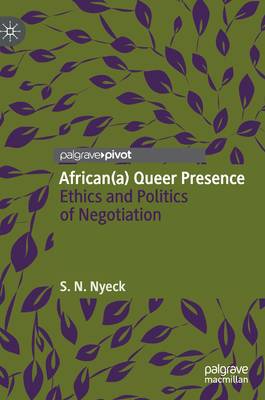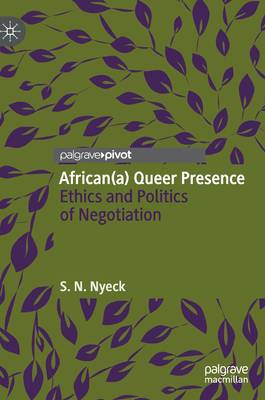
- Retrait gratuit dans votre magasin Club
- 7.000.000 titres dans notre catalogue
- Payer en toute sécurité
- Toujours un magasin près de chez vous
- Retrait gratuit dans votre magasin Club
- 7.000.0000 titres dans notre catalogue
- Payer en toute sécurité
- Toujours un magasin près de chez vous
Description
To achieve something by way of negation is not just to state a difference. It is to impose a certain kind of violence and domination on things so ordered around for the sake of epistemic, religious, or political expediency also. The notion of queerness presented in this book takes the view that the process of conceptualizing selves "out-of-order" is fundamentally anti-dialectical, negotiated, political and spiritual. Queerness negation manifested as a form of colonial and postcolonial epistemic and political violence defines reality as the clash of ideal and non-ideal categories. The demand to achieve something by way of negation that dialectics imposes on itself is costly because it treats negation as inevitable. From an anti-dialectical standpoint, analyses of the films Proteus and Karmen Geï deal with the processes of freeing queer selves from colonial and postcolonial negation. The book reflects on the conditions and possibilities of queerness affirmation as an ethics of presence grounded in the politics of negotiation following the proposition of nego-feminism and the practical humanism of Senghor to offer an ethical and embodied vision of an ecological depth of feeling and will as foundational to relational possibilities within the African(a) world.
Spécifications
Parties prenantes
- Auteur(s) :
- Editeur:
Contenu
- Nombre de pages :
- 132
- Langue:
- Anglais
Caractéristiques
- EAN:
- 9783319612249
- Date de parution :
- 27-09-21
- Format:
- Livre relié
- Format numérique:
- Genaaid
- Dimensions :
- 148 mm x 210 mm
- Poids :
- 326 g

Les avis
Nous publions uniquement les avis qui respectent les conditions requises. Consultez nos conditions pour les avis.






